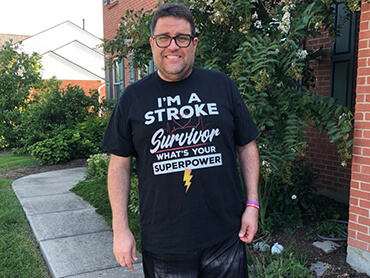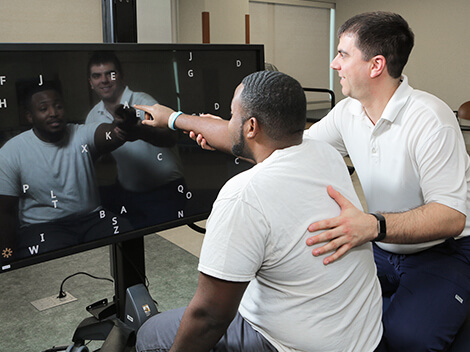Stroke Rehabilitation
Stroke is a leading cause of hospitalization and long-term disability in the U.S. When you choose our hospitals for stroke care and recovery, you are choosing a leader in comprehensive stroke rehabilitation.
Recovery from stroke can be challenging — for patient and family. Your choice of a stroke rehabilitation program is an important one. The American Heart Association and American Stroke Association recommend receiving treatment in an inpatient rehabilitation hospital whenever possible.1 Our comprehensive inpatient stroke rehabilitation program is a road to recovering independence and quality of life.

How our inpatient stroke rehabilitation excels in care delivery
Our hospitals treat patients with a wide range of complex medical, physical, cognitive and emotional needs. This gives us unparalleled expertise and experience to address your individual challenges, goals and hopes for the future.
Our rehabilitation excellence starts with providing the best clinical practices in stroke rehabilitative care.
The goal in our hospitals is to help patients recover as much of their abilities and independence as possible. This begins the moment you or a loved one comes into our care and continues for the length of your stay with us.
We work in partnership — patient, family and caregivers — through every step in treatment. This partnership is guided by our team of physicians, nurses, therapy specialists, nutritionists and clinical experts.
Care is personalized for each patient and their recovery goals. We use a combination of specialized therapies to help stroke survivors regain strength, health and self-sufficiency. Specialty areas include, physical, occupational, and/or speech therapies. This approach, and the caring commitment of our teams, makes people’s lives better after stroke.
-
Stroke rehabilitation requires a sustained effort across all team members for the patient to reach their full potential. Our teams include physicians, nurses, therapists and case managers. The patient, their friends and family are also an important part of this coordinated care team.
We include family members in this partnership to learn about and help make decisions for care delivery.
We offer a carefully integrated program of stroke care that makes a difference in patient outcomes.
The benefit of coordinated care at all points in patient treatment has been recognized in medical studies. Stroke survivors who choose an inpatient rehabilitation hospital have greater improvement with fewer complications, and are able to return home sooner than those treated at nursing facilities or other settings.1,2,3
At our hospitals, you’ll find a highly individualized, carefully integrated program of stroke care that has been shown to make the difference in our patients’ outcomes.
-
A comprehensive treatment plan is critical for stroke rehabilitation and recovery. Each patient’s plan is created with the expertise of an interdisciplinary team.
Teams are led by a physiatrist, a doctor who specializes in physical medicine and rehabilitation. This board-certified expert guides the nurses; physical, occupational and speech therapists; dietitians; case managers and other clinical staff who play active roles in treatment.
The combined experience of our teams allows us to effectively address the range of medical, physical, functional and emotional issues of stroke survivors and their loved ones.
-
Studies show that the sooner you begin a highly coordinated, comprehensive stroke rehabilitation program, the greater gains you are likely to achieve.1
Our hospitals offer an early start with rehabilitation that leads to faster recovery. We work closely with you, your family and the referring hospital to ensure a smooth transition to our program.
Upon admission, we require a minimum of three hours of physical, occupational and/or speech therapy a day, five days a week. This builds a foundation for recovery.
You and your family will also receive education and training to help maintain your overall health and well-being leading up to discharge.
-
Treatment is carefully tailored to your specific needs and goals. The extent of a stroke’s impact will determine our scope of treatment, but we can help you:
- Restore physical function and the ability to perform daily activities
- Gain strength and endurance
- Improve balance and mobility
- Overcome speech or communication deficits
- Treat swallowing and speech issues
- Meet nutritional needs
- Adapt for issues with memory, concentration and learning
- Improve vision deficits
- Deal with mental, social or emotional health needs
- Return to home, work, school or community activities with as much confidence and independence as possible
Your stroke care plan will help maximize recovery while taking into consideration complications from other existing medical conditions.

The technology of stroke recovery

To support your recovery, our hospitals bring innovation and cutting-edge technologies to treatment.
These are some of the advanced treatments that may be available to patients as part of their care plan:
- Robotic therapies, like the Armeo Power Trainer®, to improve motor function in the arms and hands
- Body-weight-supported gait training and electrical stimulation devices to improve balance, gait and mobility
- Mirror therapy and other techniques to improve arm and hand function
- VitalStim®, a non-invasive external stimulation therapy applied to the neck, to treat swallowing disorders
- Computer-based exercises to improve memory, concentration, decision-making and other cognitive skills
- Adaptive gaming and other platforms to help individuals enjoy recreational and social activities
Stroke recovery. Let us help.
2Comparison of Functional Status Improvements Among Patients with Stroke Receiving Postacute Care in Inpatient Rehabilitation vs. Skilled Nursing Facilities. JAMA. 2019.
3Assessment of Patient Outcomes of Rehabilitative Care Provided in Inpatient Rehabilitation Facilities (IRFs) and After Discharge.